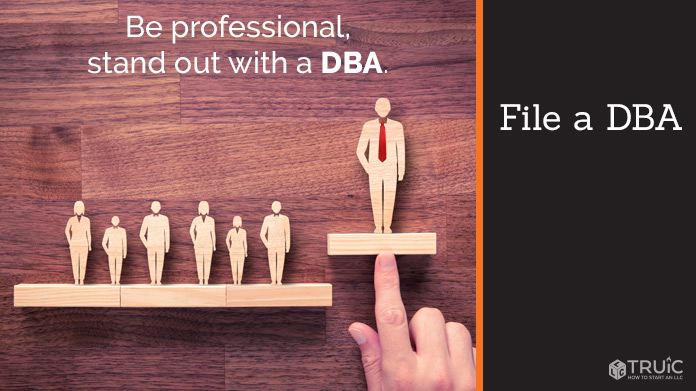How To Register A Dba
How to File a DBA
Filing a DBA (doing business as), also known as an assumed name, trade name, or fictitious name, is an easy process that is achieved by registering with your state, county, and/or city.
Follow our step-by-step How to File a DBA guide to get started today.
Filing a DBA won't protect your personal assets like forming an LLC or corporation will. Learn why in our DBA vs LLC guide.

- How to Set Up a DBA
- What is a DBA
- What a DBA is Not
- When to Use a DBA
- How to File a DBA FAQ
DBA Meaning:A DBA is any name a business operates under that isn't its legal name. Your state might refer to a DBA as a fictitious name, assumed name, or trade name.
Sole proprietors and partnerships can operate under a DBA name instead of their surnames. LLCs and corporations can use a DBA name to diversify their brand.
In this video, we break down what a DBA is, how and when to use a DBA, and how to file a DBA for your business.
How to Set Up a DBA
1) Select Your State
DBA guidelines and laws vary from state to state. In some cases, you will need to register your DBA with the state government and in others, the county or city government.
Several states require you to register a DBA with more than one level of government. For instance, a general partnership may have to file at the state and county level in one state, while another state may require that same general partnership to file with just the county.
NOTE: You cannot file for a DBA in Kansas, New Mexico, or South Carolina.
The best place to begin your DBA filing process is with our simple step-by-step state DBA guides:
- Alabama
- Alaska
- Arizona
- Arkansas
- California
- Colorado
- Connecticut
- Delaware
- Florida
- Georgia
- Hawaii
- Idaho
- Illinois
- Indiana
- Iowa
- Kentucky
- Louisiana
- Maine
- Maryland
- Massachusetts
- Michigan
- Minnesota
- Mississippi
- Missouri
- Montana
- Nebraska
- Nevada
- New Hampshire
- New Jersey
- New York
- North Carolina
- North Dakota
- Ohio
- Oklahoma
- Oregon
- Pennsylvania
- Rhode Island
- South Dakota
- Tennessee
- Texas
- Utah
- Vermont
- Virginia
- Washington
- Washington D.C.
- West Virginia
- Wisconsin
- Wyoming
Step 2) Complete a DBA Name Search
Before you file, you should make sure your name isn't taken by—or too similar to—another registered business in your state. You will also want to make sure your DBA meets your state's naming guidelines. Our step-by-step guides discuss this step in detail for your state.
If you need extra help choosing a business name, select your state from the drop-down menu on our How to Name a Business guide.
Need Help Creating a Brand Name and Logo?
If you need help coming up with a DBA name, try our business name generator. Then, create a unique logo for your brand with our free logo generator.
We recommend securing your domain name (URL) for your DBA as soon as possible. By reserving your domain name, you ensure it won't be acquired by another business owner.
Once you reserve a domain name for your DBA, consider setting up a business phone system to help strengthen your customer service and boost credibility. We recommend Nextiva because of its affordable pricing and variety of useful features. Start calling with Nextiva.
Step 3) Register Your DBA with the State
You will need to file your DBA with the state or with the county/city clerk's office depending on your location and business structure,
Several states require you to register a DBA with more than one level of government. For example, a sole proprietorship may have to file at the state and county level in one state, while another state may require that same sole proprietorship to file with just the county.
We show you exactly how to get a DBA in on our state-specific How to File a DBA guides. You can also read our list of the best DBA filing services.
What is a DBA?
A DBA is any name a business operates under that isn't its legal name. In many states, you can operate under a different name as long as you officially register it with the proper city, county, or state agency.
DBAs are used by sole proprietorships, partnerships, LLCs, and corporations for branding purposes. There are two main reasons why you would need a DBA:
- You have a registered formal business entity looking to branch out into new products, services or brands, or to rebrand in general.
- You have an unregistered business such as a sole proprietorship or partnership and would like to operate under a name other than your personal name. This option should only be used by businesses withvery low profit and risk.
What a DBA is Not
A DBA isn't a legal business entity. It is just a name that your business can use instead of its legal name. DBAs must be attached to a business entity.
Some examples of business entities include:
- Sole Proprietorships (not a legal entity)
- General Partnerships
- Limited Liability Companies (LLCs)
- For-Profit and Nonprofit Corporations
- Limited Partnerships (LPs)
- Limited Liability Partnerships (LLPs)
When you form a business entity such as a limited liability company (LLC), corporation (S corp or C corp), limited partnership (LP), or limited liability partnership (LLP), your business has limited liability protection. Limited liability protection means that if your business is sued, your personal assets are protected.
Sole proprietorships and general partnerships legally operate under the owner's personal name and do NOT have limited liability protection. You can operate under a DBA as a sole proprietor or general partnership but the business will still not have limited liability protection.
DBA vs. LLC
Potential business owners sometimes ask what the difference is between an LLC and a DBA. The answer is that an LLC and a DBA are two very different things.
An LLC is a business entity type like a corporation or a partnership. It can operate with or without a DBA.
A DBA, on the other hand, is essentially a nickname for a business. It must be attached to a business structure (like an LLC).
TIP: For more details on the difference between an LLC and a DBA, visit our DBA vs LLC guide.
DBA Taxes
Business taxes are determined by a business's structure. Each business structure has specific filing requirements set forth by the IRS.
Because a DBA isn't a business entity, you do not have to file a tax return specifically for a DBA. The income or loss from a DBA is factored into your total tax liability for the business.
That is, if your DBA doesn't do well and has a loss, those numbers will be calculated within the tax liability for your business.
TIP: For more information on business taxes, visit our tax guide.
DBA EINs
An EIN (employer identification number) is like a business's Social Security Number. The IRS uses EINs to keep track of a business's tax reporting. Any business with employees must file for an EIN in order to remain compliant with the government.
Because a DBA is not a business entity, there is no such thing as an EIN for a DBA. The business structure that the DBA is attached to, if it has employees, will have an EIN.
TIP: To learn more about when to use an EIN, read our What is an EIN guide.
When to Use a DBA
Branding
Whether your business is a sole proprietorship, partnership, LLC, or corporation, filing a doing business as name can make it easier to create or build a particular brand. If your business offers multiple distinct products or services, registering a DBA can help you highlight and market certain ones in a unique way.
If you're operating a sole proprietorship or partnership, choosing a doing business as name for your business can make it easier to market your company, helping to attract more customers.
Privacy
Sole proprietorships and general partnerships are required to use their surnames (last names) as their legal name. If your business is a sole proprietorship and you don't want your name in directories, online, or on public record, then it's a good practice to set up a DBA to protect your privacy.
Setting Up Multiple Businesses Under One LLC
Entrepreneurs who want to create several different businesses can do so under one limited liability company (LLC) by creating DBAs for each one.
Banking
Some banks require sole proprietors and general partnerships to have a DBA in order to open a business account. It also adds credibility when you accept payment in the business name that customers expect to see.
Domain Name Availability
Your business name might not be available as a domain name. Some business owner's choose to file a DBA that matches their domain name.
Credibility
Sole proprietors and general partnerships can sometimes gain more credibility with a business name that isn't their own name.
How To File A DBA FAQ
How many DBAs can I have?
You can have as many DBAs as you can afford to create and are able to keep track of. Each one comes with additional incremental expenses and paperwork, meaning more is not necessarily better.
Can a DBA get an EIN or Tax ID?
DBAs aren't required to have a separate EIN because DBAs aren't a business entity. The business entity that the DBA is under would have an EIN if an EIN is required.
To learn more about EINs and when you need one for your business, read our What is an EIN guide.
Can a DBA become an LLC?
No. An LLC is a businessentity, while a DBA is just aname for a business.
Sole proprietorships are often confused with DBAs, but they are not the same: a sole proprietorship is a business entity, therefore it can choose to become an LLC.
To learn how to form an LLC, visit our Form an LLC state guides.
Can a DBA have Inc. in the name?
A DBA can only have Inc. in the name if the business entity the DBA is attached to is a corporation.
How do I set up a DBA for a rental property?
Holding a rental property in your name and with a DBA will not afford you any protection. The best option is to form an LLC to protect your personal assets in the event of an issue with the rental property. In any case, it is always best to consult an attorney.
When would it be good to get a DBA versus a legal name change?
Getting a DBA is often a better choice than changing your business's legal name. If you want to rebrand your company or focus on another line of business, filing for a DBA is a simpler process than filing for a legal name change.
Is my DBA protected from being used in other places?
Some state-level laws prevent DBAs that are too similar to existing ones from being used, but this varies from state to state. It is possible to trademark a DBA, which would offer stronger protection across state lines.
Do I Need A DBA For My Business?
In most cases, a DBA is only required if you are using a business name other than your legal business name. There are some states that require one for certain business entity types. For instance, New York requires partnerships to have a DBA.
Check out our state DBA guide for your business' home state to see the rules and regulations that are relevant to you.
Additionally, if you are operating a sole proprietorship or partnership, and you are using a name other than your own, you will need a doing business as name to open a business bank account or to be listed in certain business directories.
Do I need a DBA for my LLC?
It is not necessary to have a DBA for your LLC, but there may be benefits to having one. As we mentioned earlier, a doing business as name can open up a lot of different opportunities for branding and marketing your business or particular products or services that you offer.
Featured Articles

How to Name Your Business

How to Form an LLC

What is a DBA?

Choosing a Business Structure
How To Register A Dba
Source: https://howtostartanllc.com/how-to-file-a-dba
Posted by: dickenaticeyound.blogspot.com

0 Response to "How To Register A Dba"
Post a Comment